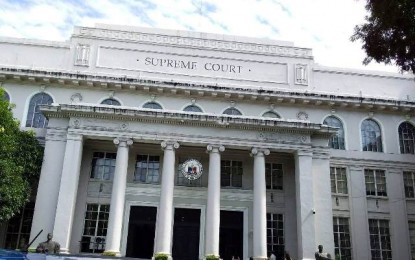
(File photo)
MANILA – The Supreme Court (SC) has turned down a petition filed against the Commission on Elections (Comelec) to bare all the details of the automated election system (AES), including a plea for the poll body to authorize physical visits to its information technology hubs.
In its 22-page decision written by Associate Justice Ricardo B. Rosario and posted online on Thursday, the high court en banc said “the law does not mandate the Comelec to allow physical access to its hubs, servers and data centers,” adding, among other things, that the “constitutional policy of full disclosure of transactions involving public interest and the right to information are circumscribed by reasonable conditions and limitations as may be provided by law.”
The petition was filed by the National Press Club of the Philippines, Automated Election System Watch (AES Watch) and Guardians Brotherhood Inc., asking the court to compel the poll body to disclose critical information and allow access and inspection of ballot printing, destruction of defective ballots, configuration of data memory cards to be used in the Comelec Laguna warehouse, the preparation and deployment of vote counting machines (VCMs) and the Comelec’s National Technical Support Center, including data centers, provincial and regional hubs as well as the transmission diagram and data communications details.
“At most, the Comelec may be compelled to provide information regarding its technical hubs and data centers, as it had already done so, but it cannot be compelled to allow what the law clearly prohibits. Unlike access to the premises of the printer for purposes of guarding the same or witnessing the printing and distribution of the ballots and returns, there is no legal right to allow physical access to the technical hubs or data centers of the automated election system,” the SC said.
The SC added that the poll body does not have a ministerial duty to allow access to its technical hubs, servers and data centers.
The court likewise said that the law does not mandate the Comelec to allow physical access to its hubs, servers, and data centers, adding that the constitutional right to information does not extend to physical access to said facilities and the right is subject to reasonable conditions and limitations.
However, the court said in terms of access to and examination of the transmission diagram or data/communications network architecture of the VCMs, Comelec has failed to discharge its burden of showing that such information is not a matter of public concern or that it is exempted by law from constitutional guarantee.
“In fact, such documents are matters of public concern and interest which should be made available, especially considering that unauthorized transmission and communications to and from network nodes plotted in the diagram or architecture may call into question the integrity of the elections,” the court said.
“We hold therefore, that were it not for the mootness of the issue, the Comelec may be compelled via a writ of mandamus to disclose the complete transmission diagram and data/communications network architecture of the VCMs,” it added.
Nevertheless, the court said the request for Comelec to publicly disclose all details of the transmission router and all devices and equipment that will be used is “too broad and vague.”
“Certainly, we cannot compel the Comelec to reveal all details, some of which may contain confidential information, which, if divulged, could pose serious security risks,” the SC said. (PNA)
